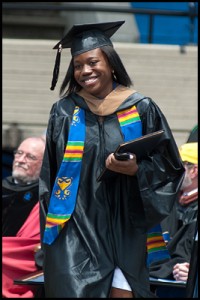We recently wrote a blog post entitled “Mentors Can Fill Gaps Left by Lack of Parental Support.” In that post, we discussed a recent study looking at adolescent interventions like Upward Bound and Talent Search, and we added our thoughts about Bottom Line’s role as a complement to these programs.
After posting this, we received some criticism from readers believing that our post was meant to disparage Upward Bound. We were pleased to see that people have been reading our blog, and we welcome these types of discussions. In this case, though, we believe the negative feedback was more a result of misunderstanding than disagreement. And so we’d like to continue the discussion.
In that post, we quoted Dr. Rachael Walsh’s recent study “Helping or Hurting: Are Adolescent Intervention Programs Minimizing Racial Inequality,” published in Education and Urban Society in December 2010. As we stated, Dr. Walsh’s study found that Upward Bound and Talent Search were effective at increasing college attendance rates. The study found that students were 17% more likely to attend college if they participated in one of these programs. And we applaud Upward Bound and Talent Search for this success. The study shows that these programs are helping low-income and first-generation students enroll in college at the same rates as the general population.
Perhaps poorly articulated in our original post, we at Bottom Line believe that the study did not go far enough in demonstrating that college enrollment is not enough. A college degree is the true goal, and our program was founded in 1997 to ensure that students who begin college make it through to the finish line. While we believe that middle-school and high-school programs can create a college-going culture and can increase college enrollment, there is more that must be done. According to Dr. Walsh, “[Socio-economic Status] and family composition continue to have statistical significance in the lives and future choices of students, regardless of the programs provided by the federal government.”
We take this to mean that helping a student get in to college does not guarantee their success beyond that. And this should come as no surprise. The college graduation rates of disadvantaged, urban students are unacceptably low. For Boston’s high school class of 2003, only 41% of all students who began attending college graduated in 6 years. For Black and Hispanic students, the graduation rate was 33% and 30% respectively.
We readily acknowledge that no program can be all things to all people. For example, Bottom Line is not in high schools or embedded on a college campus and isn’t able to create the college-going culture and provide the college-preparation that programs like Talent Search and Upward Bound provide. At the same time, unlike most school based programs, Bottom Line continues to provide a comprehensive range of mentoring and support services to students for up to six years of college. As a result, our college students are between 27% and 43% more likely to graduate with a degree.
Each of these limitations can be turned into strengths if we can work together to provide transitional services to ensure the pipeline of support leads from one organization or program to another. We, as a community and as a country, are helping students get in to college and we’re getting better at that. But, the conversation shouldn’t stop there.




